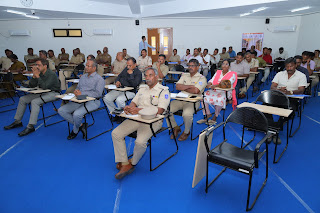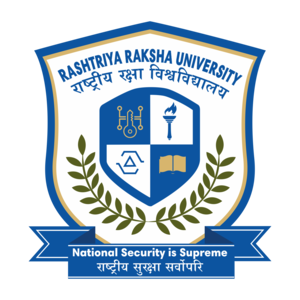The second day of the program commenced as planned, primarily utilizing web-enhanced instruction and blended learning modalities.
The first session was led by Dr. Subhajit Bandopadhyay, Assistant Professor of Geoinformatics and Disaster Management at RRU Gujarat. Dr. Bandopadhyay discussed the use of Geographic Information Systems (GIS) in policing and disaster prevention. He highlighted how GIS can map risk areas, predict disaster scenarios, and orchestrate response strategies. Through practical demonstrations, he showed the applications of GIS tools in real-time monitoring and analysis, which enable law enforcement to better coordinate responses and optimize resource allocation during emergencies. He emphasized the importance of leveraging technological tools for enhanced preventative measures and discussed collaborative approaches between agencies. To illustrate the practical impact of GIS systems, he used real-time disaster flow simulations. Additionally, he employed the Kerala Vayanad landslide as a case study to underscore the complexities of disaster management and the necessity for advanced planning and technological integration.

Following this, Dr. Mahesh Tripathi, Associate Professor at RRU Gujarat's School of Behavioral Sciences and Forensic Investigation, shared invaluable insights based on his extensive experience. Dr. Tripathi discussed the psychological aspects of criminal investigations, emphasizing the importance of empathy, intuition, and strategic questioning in building rapport with suspects and witnesses. He provided instruction on psychological behaviors and body language analysis, teaching participants how to interpret subtle cues and nonverbal signals. Drawing from his experience handling cold cases, he shared methods and findings, illustrating how psychological insights can aid in solving complex cases. The session concluded with a discussion, allowing participants to reflect on the concepts and explore how to apply the techniques in their own investigative work.
.jpg)
The final session was conducted by Ms. Anshu Singh, Teaching cum Research Officer in Forensic Accounting & Financial Investigation. She provided an insightful session on financial frauds, exploring the fundamental principles behind various types of financial crimes and the typical patterns they follow. Her presentation offered a comprehensive overview of how fraudulent schemes operate and the key indicators that can signal their presence. Ms. Singh focused on the practical applications of technology in combating financial fraud, highlighting cutting-edge tools and advanced technologies currently used to detect and prevent irregularities. She discussed innovations such as artificial intelligence and sophisticated data analytics and their transformative impact on how financial institutions identify and respond to fraudulent activities. Additionally, she covered some aspects of the dark web. The session ended with a discussion, allowing participants to engage with the material and ask questions.


.jpg)










.JPG)

0 Comments